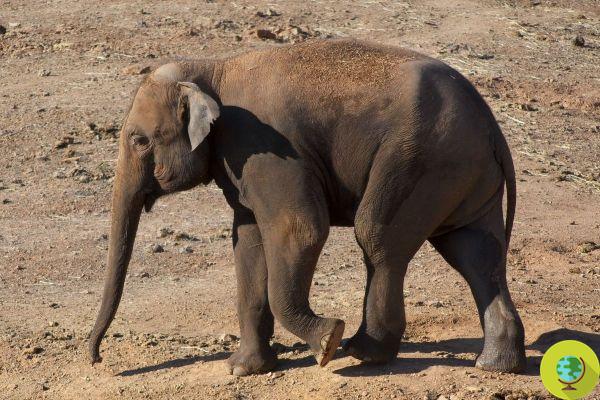
It is the females of the species that pay the highest price of poaching for ivory tusks, with an evolutionary deviation that risks upsetting the entire ecosystem.
He is about to end up run over, his mother saves himIt is the females of the species that pay the highest price of poaching for ivory tusks, with an evolutionary deviation that risks upsetting the entire ecosystem.
Researchers at Princeton University launch a worrying alarm: the elephants that live inside the Gorongosa National Park, in Mozambique, they lost their characteristic fangs within a few decades. In just thirty years, between 1977 and 2004, the number of female elephants without tusks dropped from 18.5% to 33% of the total. An evolutionary question, certainly, but dictated by human action.
In fact, in 1977, the country entered a bloody civil war that lasted 15 years, and both sides hunted elephants to sell their precious tusks and thus obtain the money necessary to finance the war efforts. At the end of the conflict, the elephant population in the protected area of Gorongosa it has decreased by 90% and the presence of females without tusks has practically tripled - up to today's situation, in which one third of the elephants are born without tusks (before the war they were one in five). The absence of tusks therefore seems to be a form of adaptation to humans: since poachers target elephants with tusks, those without this appendix have a much better chance of survival. Researchers estimate that, between 1972 and 2000, for every female with fangs who survived poaching, there are five without fangs.
(Read also: Plastic waste on beaches is giving birth to all female turtles, the alarm of biologists)
One might ask, at this point, why the evolutionary trait relating to the absence of tusks is a prerogative of the females and does not also involve the males. To find an answer to this question, the researchers sequenced the genomes of the park's elephants, both those with tusks and those without tusks, and identified a dominant gene that could be responsible for the absence of the appendix: AMELX. , which is transmitted from mother to offspring via the X chromosome and is also present in the human genome. A defect in this gene, in our species, causes problems with the growth of teeth in females, and death in males. The researchers hypothesized that the same is true for the elephant species: while females develop without tusks, males die.
It might seem like a minor issue, the absence of tusks in elephants, and instead this trend is likely to affect the entire African ecosystem. The tusks, in fact, perform many functions - they are used to dig underground sources of water, dig up minerals, detach the bark from trees: without the tusks, the behavior of animals changes and, consequently, their diet. In addition, there are other animals of the savannah that are dependent on the behavior of elephants and the changes they make to the ecosystem - without them, the life of other species will also undergo changes.
This is an example of how human activity is changing the evolutionary trajectory of species on earth - explain i researchers. - Human beings represent the most influential evolutionary drive in the history of the planet, almost as much as the great events of the past that caused mass extinctions.
Follow your Telegram | Instagram | Facebook | TikTok | Youtube
Fonte: Science
We also recommend:
- The UK wants to ban elephants in zoos by law
- Ethiopia has just seen one of the largest elephant massacres killed in a single day by poachers
- So the plastic in the oceans is creating a very dangerous "evolutionary trap" for young sea turtles


























